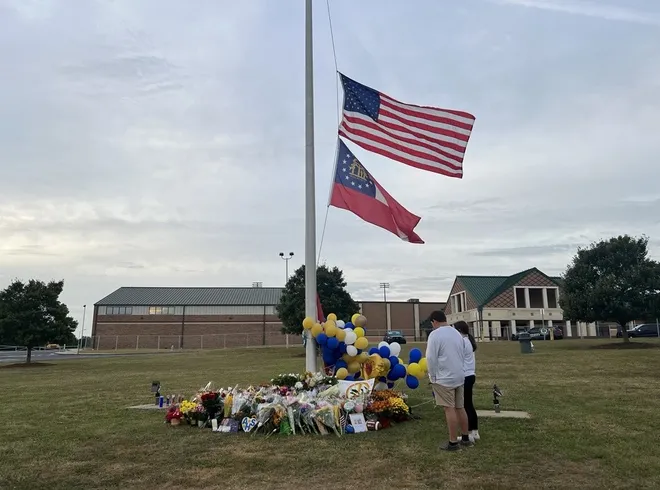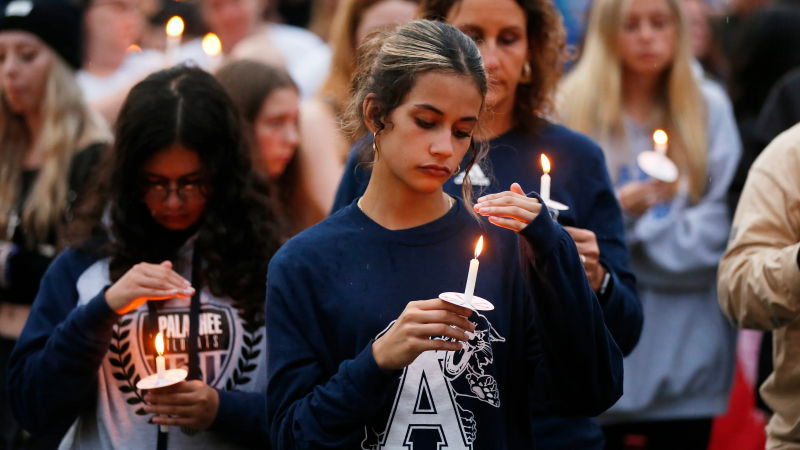Why an ominous warning didn't stop Georgia school shooting
Keep your guns locked up.
That’s what sheriff’s deputies told Colin Gray when they came to investigate a school shooting threat in May of 2023. Sixteen months later, Gray’s 14-year-old son Colt is accused of opening fire at his high school, killing two students and two teachers and wounding nine others.
Both Colin Gray and his son are now in custody, with the former charged with second-degree murder, involuntary manslaughter and cruelty to children because authorities said he gave access to firearms to his son despite knowing he was a threat to others.
Experts say it's unsurprising that the May 2023 investigation didn't prevent this week's tragedy.
There’s only so much law enforcement can do to stop a crime like a mass shooting from occurring in advance, said Adam Winkler, a law professor and gun policy expert at UCLA.
“We have to be realistic about what you can accomplish in a society that has over 400 million guns and they're very easy to obtain,” Winkler said.

Was the FBI tracking the accused shooter?
The notion that the shooting suspect was on the FBI’s “radar” for over a year is a misunderstanding of how law enforcement operates, according to Katherine Schweit, a former FBI agent who created the FBI’s active shooter program.
“Because somebody interacts with law enforcement doesn't give law enforcement the authority – federal, state or local or tribal – to constantly go back into somebody's personal life and check on them and check on them,” Schweit said.
What did law enforcement do in 2023?
The FBI alerted local law enforcement about threats to commit a school shooting made on the online platform Discord. They traced the account that made the threats to an address where Colin Gray and his son previously lived and had since moved from in Jefferson, Georgia.
The Jackson County Sheriff’s Office went to speak with them. The then 13-year-old told investigators at the time that he did not make the threat and that he had deleted his Discord account because it had been hacked, according to a report by the sheriff’s office. When authorities tried to trace the source of the threat further using IP addresses, they said they could not confirm that it was made by the teen. The account appeared to have been accessed from multiple places in the U.S.
Colin Gray told them that he had rifles for hunting in the home, but that his son did not have unsupervised access to them.
“I urged Colin to keep his firearms locked away,” wrote Daniel Miller Jr., lead investigator.
Why didn't authorities do more?
Without confirmation of who made the threat and denials from the teen, the case was “exceptionally cleared,” Miller wrote in the report.
“At this time, due to the inconsistent nature of the information received by the FBI, the allegation that Colt or Colin is the user behind the Discord account that made the threat cannot be substantiated,” Miller wrote.
The FBI in Atlanta said in a statement that the county alerted schools so they could monitor the student, but that there was no probable cause for law enforcement on any level to take further action.
“If there is nothing that indicates that there's probable cause to believe a crime is occurring or can or will be occurring, the law enforcement officer can't, for instance, arrest an individual or confiscate weapons that might be in somebody's home and lawfully owned,” Schweit said.
Georgia also doesn’t have a so-called “red flag” law, which would allow for authorities to confiscate guns if they believe the owner to pose a threat.
Who is responsible for preventing a school shooting?
The May 2023 investigation illustrates some of the constraints law enforcement faces when investigating threats.
“That is what law enforcement – hundreds of thousands of law enforcement – deal with every day is having to evaluate: How serious is this threat, how serious is this situation on the street? And they have to make a determination, and then they have to keep moving,” Schweit said. “You can't just arrest everybody, because we don't live in that kind of a country, and we don't want to live in that kind of a country.”
Meanwhile, some prosecutors are seeking to hold parents accountable when their children commit violent crimes with guns connected to the parents.

Colin Gray’s charges are only the second time in the U.S. that the parent of a mass school shooter has been criminally charged for deaths allegedly caused by their child. Just months ago, Jennifer and James Crumbley were each sentenced to 10 to 15 years in prison for involuntary manslaughter in the mass shooting their son committed at his Michigan high school.
A law enforcement warning puts parents 'on notice'
The visit from law enforcement in Georgia may not have resulted in arrests or guns being confiscated, but it could have helped prevent the tragedy anyway, experts said.
“There were reasons to be concerned about the child's access to firearms,” Winkler said. The warning to lock up guns helps show that the parent was “on notice."
Schweit said any signs that the suspect may have exhibited over the last year are ones that the community may have witnessed, not just law enforcement. There are failures at a cultural and societal level when a shooting happens, she said.
“Every time there’s a shooting, there were failures. There's no question about that,” Schweit said. “We need to be more aware of when somebody is a troubled individual. We need to be more aware of when a troubled individual has access to guns."
Disclaimer: The copyright of this article belongs to the original author. Reposting this article is solely for the purpose of information dissemination and does not constitute any investment advice. If there is any infringement, please contact us immediately. We will make corrections or deletions as necessary. Thank you.






